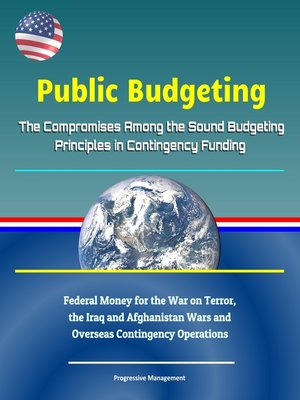Public Budgeting
ebook ∣ The Compromises Among the Sound Budgeting Principles in Contingency Funding--Federal Money for the War on Terror, the Iraq and Afghanistan Wars and Overseas Contingency Operations

Sign up to save your library
With an OverDrive account, you can save your favorite libraries for at-a-glance information about availability. Find out more about OverDrive accounts.
Find this title in Libby, the library reading app by OverDrive.



Search for a digital library with this title
Title found at these libraries:
| Library Name | Distance |
|---|---|
| Loading... |
This report has been professionally converted for accurate flowing-text e-book format reproduction. The purpose of this thesis is to observe the budgeting practices of the government in funding contingency operations to determine to what extent a policy-maker's actions result in compromises among the sound public budgeting principles. To accomplish the objective, this thesis evaluates the evolution of budgeting practices used in funding overseas contingency operations from 2001 to 2016 and determines the level of application of the sound budgeting principles to the budgeting practices. To illustrate the application of use, this thesis first defines the principles of sound public budgeting and maps the differing budgeting practices to the characteristics along a relative spectrum of high, medium, and low to determine if there are discernible patterns. A framework does not exist for Congress to fund for contingencies; policy-makers must therefore use budgeting practices that are less than ideal. Since the attacks of 9/11, the United States has funded contingency operations through processes different from normal budgeting. Over the last 15 years, those budgeting practices have evolved in a manner that questions to what extent funding for contingency operations is consistent with the principles of sound public budgeting. An analysis shows that compromises are made among the principles to adequately fund for contingency operations.
Chapter I provides an overview, the background information of this thesis, its purpose, and the scope of the research. Chapter II reviews contingency budgeting in the United States, defines the principles of sound public budgeting, and describes what is supposed to happen during the budgeting process both in a normal situation and in the case of an emergency. Chapter III reviews historical events from FY01 to FY16 focusing on the significant changes in budgeting practices and the motivations behind those changes. Chapter IV provides an evaluation of contingency budgeting practices by using the principles of sound public budgeting and presents a comparative analysis and discussion of the extent to which contingency operations are budgeted for and appropriated. Chapter V provides a conclusion to the extent that budgeting practices have evolved over the years because of compromises made to the sound budgeting principles. It also offers a recommendation for budgeting for contingencies while maintaining integrity in the budgeting system using the principles of sound budgeting, based on the lessons learned between 2001 and 2016.







